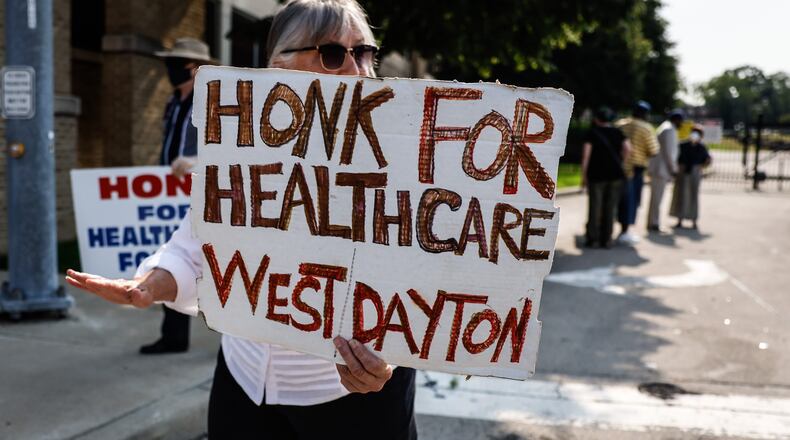Rev. Rockney Carter, with the Community Clergy Coalition that filed the pending civil rights complaint, spoke Friday morning at a news conference with other clergy and residents and thanked those who had protested the closing.
“We stand here today victorious, if but for a moment. And we just want to say thank you to God, we want to say thank you to these people, we want to say thank you to the community who kept believing in us,” Carter said.
Credit: JIM NOELKER
Credit: JIM NOELKER
The plan for the new medical center is being led by Phoenix Next, the organization led by Premier, city staff and residents.
After several years of site Phoenix Next planning and community meetings, the medical center was announced as the first committed project with the goal of attracting other organizations for a larger redevelopment. Some types of medical and wellness projects were among the site recommendations that came out last year during the planning meetings.
Premier said Friday that health care continues to shift from the inpatient to outpatient setting, further reducing the demand for inpatient beds — the primary reason Good Samaritan closed.
“The past three years have confirmed this decision. Premier Health plans to expand convenient access to outpatient services at the former Good Samaritan site — services that reflect input from community meetings and received a positive response recently from neighborhood residents,” Premier stated.
The health system stated that even during the pandemic surge, Miami Valley Hospital “had the capacity to handle the surge in cases and continue to provide all other services.”
The group of clergy organized as the Community Clergy Coalition filed a federal civil rights complaint in 2018 claiming the decision to close Good Sam would have a discriminatory and adverse effect on Black residents served by the hospital.
In a later expansion of the civil rights complaint, they compiled a list of the millions of dollars in recent construction in other parts of the region where the populations are majority white and wealthier.
After the expanded complaint, Premier Health said expansion efforts are focused on areas of population growth and on adding outpatient services, which are in more demand than inpatient services.
The complaint filed with Office of Civil Rights with the U.S. Department of Health and Human Services is still pending and the group does not plan to drop it.
Ellis Jacobs, attorney with ABLE representing the clergy, said it’s an important step in recognizing the need to restore medical services to this community.
He said it is hard to say whether the project is enough without more details, but to there are other Premier projects underway to look to for comparison, like the new medical center planned near the University of Dayton and a 14,650-square-foot emergency room expansion to a 45,000-square-foot medical office building in Beavercreek.
“So you wonder what they think they can do with a much smaller facility here. And it certainly raises some questions about their seriousness and the sorts of facilities they plan on bringing back to this community,” Jacobs said. “Nonetheless, it is a very important opening and we look forward to pursuing it with Premier.”
About the Author


